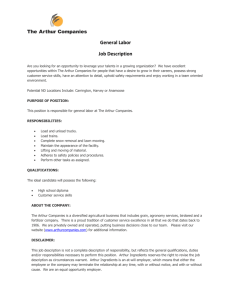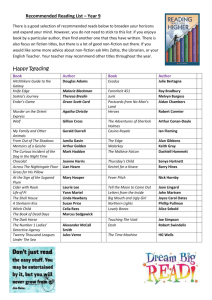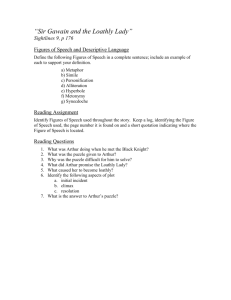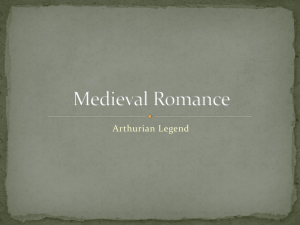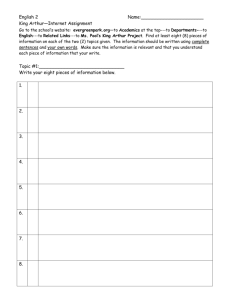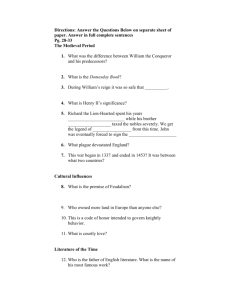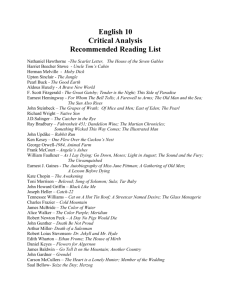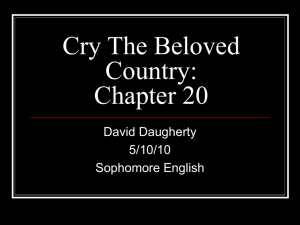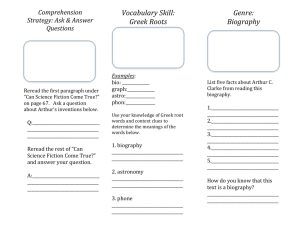Veni, Vidi, Wiki: A Prehistory of English Education
advertisement
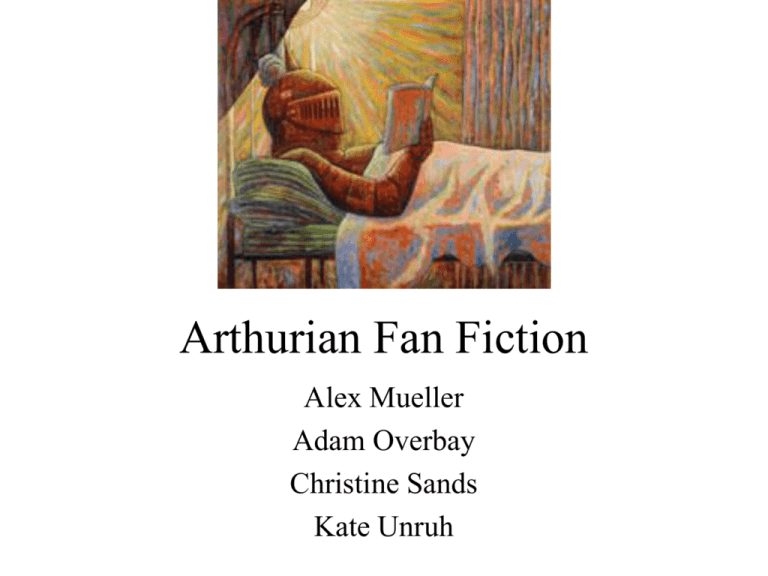
Arthurian Fan Fiction Alex Mueller Adam Overbay Christine Sands Kate Unruh Knights Who Write The Wedding of Sir Gawain and Dame Ragnelle (ca. 1450) Ye, Sir, make good chere; Lett make your hors redy To ryde into straunge contrey; And evere wheras ye mete owther man or woman, in faye, Ask of them whate they therto saye. And I shalle also ryde anoder waye And enquere of every man and woman, and get whatt I may Of every man and woman answere, And in a boke I shalle them wryte. (182-90) A Round Table Writing Workshop The Wedding of Sir Gawain and Dame Ragnelle (ca. 1450) Syr Gawen had goten answerys so many That had made a boke greatt, wytterly; To the courte he cam agayn. By that was the kyng comyn withe hys boke, And eyther on others pamplett dyd loke. (207-11) Kate Unruh as Guinevere Guinevere’s Lament O, weep for me, Virgin Mother blessed, O, weep for your daughter, Guinevere For my heart has stopped within my breast And gone are my king and chevalier Now to Avalon the king went hence And my Lancelot went in the ground For he died bravely in my defense And King Arthur’s mortal wounds abound! ... Then back to Camelot we did fly And to the table round we did go Merrily road we like times gone by And of our affair no one didst know For Lord King Arthur has my Reason But the Knight of the Cart has my Love Dear Mother I know this is Treason But I felt your consent from above! ... So many men fell this evil day So many knights that I had cherished My Lancelot, Bevidere, and Kay All on the cold earth they lay perished So Gawain too, his life was taken But valiant Arthur avenged us all And Mordred his ranks had forsaken But on him did Arthur’s rage befall! Arthur advanced on Mordred with ease But Mordred that coward fought dirty His sword-severed head Arthur did seize But fatal wounds he had half thirty And so rushed to Avalon was he That his dire wounds might be all healed By that Faery, Morgan is called she, So Excalibur he’ll again wield! O, weep for me my blessèd Mother For I mourn my sweet Lancelot’s death I fear to ever love another And now gone is my only life’s breath So forgive me mother, I have sinned Please forgive your daughter her great strife My bold transgressions do I rescind And to you will I devote my life! Christine Sands as Gwendoloena The Queen’s Appearance: Isolde’s Trial “You are truly wise, and in defending my honesty I find you a worthy friend resembling the very virtuous qualities known of Arthur’s court. It is known that you have the ability of foresight, so you are all-knowing. You also have never used your ability to deceive Arthur or any other being, as you are a good and gentle queen.” Isolde looked upon her observers, then continued, “Everyone here has heard the wise and trustworthy queen speak, telling it just as I have; no other beside the leper and my husband has been between my thighs .” Isolde spoke loudly, glancing quickly at Mark to make sure he too believed in her honesty. “You think I am defending your honesty, fair Isolde? While it is true that I have acknowledged the truth within your oath, I would claim that I did more defending of your belief in love than in honesty. After all, love is what brings you here in front of us all and begs you to reconcile with your husband and his barons.” Gwendoloena turned to King Arthur, “Wouldn’t you agree, my lord? There is nothing so strong as devoted and undying love.” Adam Overbay as Bedivere The Tale of Trwstan and Ilsdwn Hearing this exchange, Arthur was pleased and said to Bedwyr, “You are wise in both words and war, good Bedwyr, and would make a fine mentor for the child. The court of Mawrc has become weak with Norman courtesy. I bid you to take the boy as your squire, and teach him the ways of our court. Make him both warlike and wise, and aid him on whatever quest he may be about.” Bedwyr said, “As you wish it, my liege. I will raise him to be a worthy knight.” So it was that Bedwyr took the boy as a squire, and taught him the proper ways of the Arthur’s court. When Bedwyr and Kei were sent out on errands and quests for the King, Trwstan did accompany them as well. [Missing text, assumed to be enumerations of the people at Arthur’s Court.] There came a time when Mwrholt, an Irish giant, threatened the court of Arthur and demanded tributes of children and livestock from the local lords as well as the peasants. Arthur sent Bedwyr and Kei to the court of Mwrholt to settle the dispute. Together, with Trwstan, they rode seven days into the wilderness seeking the giant’s hall At dusk on the seventh day they came to a house in the woods and a woman ran out to meet them. Before she could embrace the neck of Kei, he thrust a branch between her hands, and she twisted it into a twig, saying, “Woman, had you squeezed my neck, I would never love another again!” Then when she saw Trwstan, she fell to her knees and wept, saying “You had best turn back!” Bedwyr inquired of her, “Why would you say such a thing? What peril do you think us in?” The woman answered, “The giant Mwrholt has carried away and killed twenty-three of my sons and he shall do the same to your young squire!” Kei replied, “By the hand of my friend, he will do no such thing! Tell us where this giant keeps his Hall and we will avenge your twenty-three sons and return to you any livestock he has taken as well.” So the woman did this, and the three companions rode to the court of Mwrholt. The Value of Role Play “A relativistic attitude toward scholarly arguments (for example, ‘everyone is entitled to his own opinion’) is harder to maintain, I would argue, once a student has committed to shaping a fictional voice in a particular way.” Moira Fitzgibbons, ‘“Cross-voiced’ Assignments and the Critical ‘I,’” in Teaching Chaucer, ed. Gail Ashton (New York: Palgrave Macmillan, 2007), 65-80, at 74.
